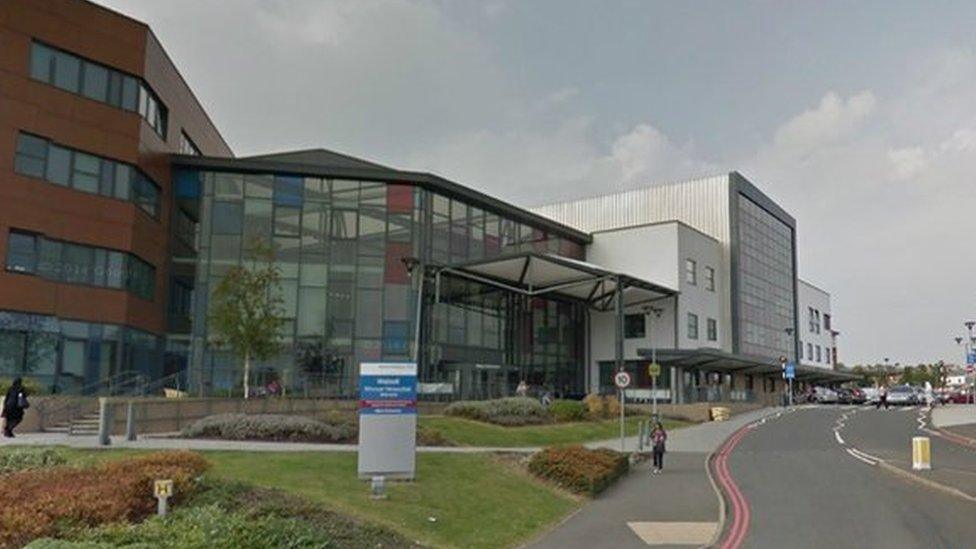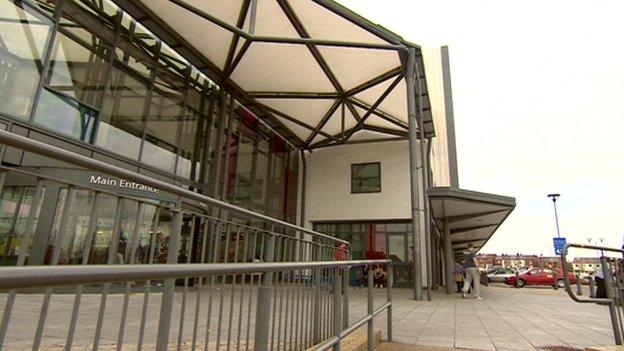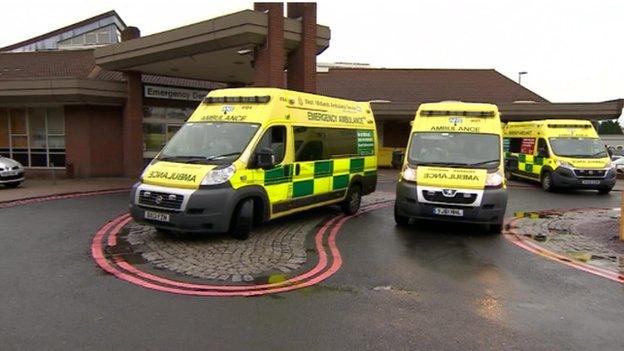Walsall Manor Hospital's NHS Trust 'should be in special measures'
- Published

Walsall Hospital NHS Trust said it was already taking urgent action to improve
A hospital deemed "unsafe" because of short-staffed maternity and A&E units should be put into special measures, an inspector has recommended.
Walsall Healthcare NHS Trust was rated inadequate by the CQC, external, which demanded urgent improvements were made.
Nine babies died in the womb in one year, the trust reported. A&E patients were not always triage scored to ensure timely treatment, inspectors found.
The trust, external said it was "already taking urgent action" to improve.
Updates on this story and more from the Black Country
The NHS Trust Development Authority will decide whether the trust should be put into special measures.
Some of the hospital's problems could be linked to the long-term troubles at nearby Stafford Hospital, according to the Care Quality Commission report.
Walsall Manor Hospital saw a 23% rise in emergency admissions between 2012-13 and 2014-15, partly due to the dissolving of the former Mid-Staffordshire Foundation Trust, the report said.
"Maternity, emergency department and medical services did not have sufficient staff to meet the needs of patients all of the time," wrote CQC's Chief Inspector of Hospitals, Professor Sir Mike Richards, external.
Six high-risk inductions of labour were delayed in one day, Prof Richards's report said.

Analysis by Michele Paduano, health correspondent, BBC Midlands Today
The report is no great surprise.
In 2008, midwives were complaining about a dangerously overstretched service.
The death of Carl Cope in June 2012 outside the accident and emergency department also highlighted serious failings.
It's true that both services have been swamped with more work following the downgrading of Stafford Hospital and it is difficult for all hospitals to recruit key staff, but the Care Quality Commission's most damning finding was bullying and a managerial failure to take action - even after problems were raised.
It's the culture in Walsall that has to change.

A woman who, under national guidance, needed a caesarean section within 30 minutes, waited 91 minutes from the decision to operate to when the baby was born, he found.
A new mother waited 90 minutes to have stitches, which increased the risk of infection, the report said.
There were regular delays in patients being handed over from ambulances to the emergency department, the team found.
Inspectors looked at patient notes in the emergency department on 10 September 2015 and found two out of the three patients' notes had no triage score recorded.
"This increased the risk patients' injuries would not be assessed and treated in a timely way," wrote Prof Richards.
Planned inspections took place on 8, 9 and 10 September, followed by three unannounced visits on 13, 20 and 24 September.
A statement from the trust said: "The trust recognises that this is not good enough for our patients and is already taking urgent action to ensure that we improve key services quickly - especially A&E and maternity."
Prof Richards said: "We found that in many areas staff were dedicated and committed to patient care despite the pressures of staff shortages."
- Published6 January 2015

- Published12 May 2015

- Published18 March 2014

- Published7 January 2015
